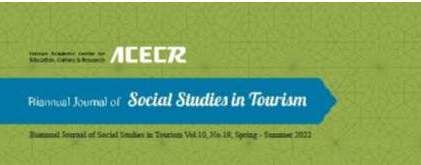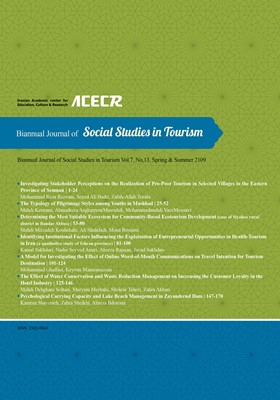Investigating Stakeholder Perceptions on the Realization of Pro-Poor Tourism in Selected Villages in the Eastern Province of Semnan
Subject Areas :Mohammad Reza Rezvani 1 , seyed ali badri 2 , Zabih-Allah Torabi 3 *
1 - University of Tehran
2 - University of Tehran
3 -
Keywords: pro-poor tourism rural poverty poverty reduction paths,
Abstract :
The poor have been the focus of attention in tourism development programs in developing countries. This has become a primary concern in tourism development programs so that the net revenues of tourism have been the reason for any tourism development initiative. The present qualitative study used content analysis to identify and explain perceptions of tourism stakeholders to reduce the poverty in the selected villages, i.e. Qaleh Bala, Abr and Reza Abad, in the east of Semnan. Because of their geographical isolation and traditional lifestyles, people in these villages suffered from poverty. In recent years, the government made efforts to reduce poverty through tourism development in these areas. The interviews with the five stakeholders showed that with government support, tourism reduced poverty in three ways: direct, indirect, and dynamic. The support had thus increased opportunities and skills for a large part of the rural poor and had also promoted relative cohesion, participation, and environmentally responsible behavior.
گزارشهای سازمان میراث فرهنگی و گردشگری استان سمنان. (1395).
گزارشهای کمیته امداد بهزیستی استان سمنان. (1395).
گزارشهای کمیته امداد امام خمینی (ره) استان سمنان. (1395).
Akyeampong, O. A. (2011). Pro-poor tourism: residents' expectations, experiences and perceptions in the Kakum National Park Area of Ghana. Journal of Sustainable Tourism, 19(2), 197-213.
Anderson, W. (2015). Cultural tourism and poverty alleviation in rural Kilimanjaro, Tanzania. Journal of Tourism and Cultural Change, 13(3), 208-224.
Anwar, J. M. (2012). Poverty Alleviation Through Sustainable Tourism: A Critical Analysis Of'Pro-Poor Tourism'And Implications For Sustainability In Bangladesh. Ritsumeikan Asia Pacific University.
Aref, F. (2011a). Barriers to community capacity building for tourism development in communities in Shiraz, Iran. Journal of Sustainable Tourism, 19(3), 347-359.
Aref, F. (2011b). Tourism industry for poverty reduction in Iran. African Journal of Business Management, 5(11), 4191.
Ashley, C., Boyd, C., & Goodwin, H. (2000). Pro-poor tourism: putting poverty at the heart of the tourism agenda.
Ashley, C., & Mitchell, J. (2009). Tourism and poverty reduction: Pathways to prosperity: Taylor & Francis.
Butler, G. (2017). Fostering community empowerment and capacity building through tourism: perspectives from Dullstroom, South Africa. Journal of Tourism and Cultural Change, 15(3), 199-212.
Chok, S., Macbeth, J., & Warren, C. (2007). Tourism as a tool for poverty alleviation: A critical analysis of ‘pro-poor tourism’and implications for sustainability. Current Issues in Tourism, 10(2-3), 144-165. Croes, R. (2014). The role of tourism in poverty reduction: an empirical assessment. Tourism Economics, 20(2), 207-226.
Davidson, L., & Sahli, M. (2015). Foreign direct investment in tourism, poverty alleviation, and sustainable development: a review of the Gambian hotel sector. Journal of Sustainable Tourism, 23(2), 167-187.
Dent, M. J., & Peters, B. (1999). The crisis of poverty and debt in the third world: Ashgate Publishing.
Dwyer, L., Gill, A., & Seetaram, N. (2012). Handbook of research methods in tourism: Quantitative and qualitative approaches: Edward Elgar Publishing.
Flick, U. (2014). An introduction to qualitative research: Sage.
Gascón, J. (2015). Pro-Poor Tourism as a Strategy to Fight Rural Poverty: A Critique. Journal of Agrarian Change, 15(4), 499-518.
Ghaderi, Z., Abooali, G., & Henderson, J. (2017). Community capacity building for tourism in a heritage village: the case of Hawraman Takht in Iran. Journal of Sustainable Tourism, 1-14.
Ghaderi, Z., & Henderson, J. C. (2012). Sustainable rural tourism in Iran: A perspective from Hawraman Village. Tourism Management Perspectives, 2, 47-54.
Hall, C. M. (2007). Pro-poor tourism: who benefits?: perspectives on tourism and poverty reduction (Vol. 3): Channel View Publications.
Harrison, D. (2008). Pro-poor Tourism: a critique. Third World Quarterly, 29(5), 851-868. doi:10.1080/01436590802105983
Harrison, D. (2015). Pro-poor Tourism: Is There Value Beyond ‘Whose’ Rhetoric? Tourism Recreation Research, 34(2), 200-202. doi:10.1080/02508281.2009.11081592
Jönsson, C. (2012). Understanding the Dimensions of Pro-Poor Tourism. Tourism Geographies, 14(2), 356-358. doi:10.1080/14616688.2012.633221
King, R., & Dinkoksung, S. (2014). Ban Pa-Ao, pro-poor tourism and uneven development. Tourism Geographies, 16(4), 687-703.
Lustig, N., & Stern, N. (2000). Broadening the agenda for poverty reduction: Opportunity, empowerment, security. Finance and Development, 37(4), 3-7.
Medina-Muñoz, D. R., Medina-Muñoz, R. D., & Gutiérrez-Pérez, F. J. (2016). The impacts of tourism on poverty alleviation: an integrated research framework. Journal of Sustainable Tourism, 24(2), 270-298.
Mitchell, J. (2012). Value chain approaches to assessing the impact of tourism on low-income households in developing countries. Journal of Sustainable Tourism, 20(3), 457-475.
Narayan-Parker, D. (2002). Empowerment and poverty reduction: A sourcebook: World Bank Publications.
Peeters, P. (2015). Pro-Poor Tourism, Climate Change and Sustainable Development. Tourism Recreation Research, 34(2), 203-205. doi:10.1080/02508281.2009.11081593
Saito, N., Ruhanen, L., & Noakes, S. (2016). International tourism consultant perspectives on pro-poor tourism projects in developing countries. CAUTHE 2016: The Changing Landscape of Tourism and Hospitality: The Impact of Emerging Markets and Emerging Destinations, 837.
Salehi-Isfahani, D. (2005). Human resources in Iran: potentials and challenges. Iranian Studies, 38(1), 117-147.
Salehi-Isfahani, D. (2009). Poverty, inequality, and populist politics in Iran. Journal of Economic Inequality, 7(1), 5-28.
Salehi-Isfahani, D., & Majbouri, M. (2013). Mobility and the dynamics of poverty in Iran: Evidence from the 1992–1995 panel survey. The quarterly review of economics and finance, 53(3), 257-267.
Salehi‐Isfahani, D., Abbasi‐Shavazi, M. J., & Hosseini‐Chavoshi, M. (2010). Family planning and fertility decline in rural Iran: the impact of rural health clinics. Health Economics, 19(S1), 159-180.
Scheyvens, R. (2007). Exploring the Tourism-Poverty Nexus. Current Issues in Tourism, 10(2), 231-254. doi:10.2167/cit318.0
Scheyvens, R. (2012). Tourism and poverty: Routledge.
Scheyvens, R., & Russell, M. (2012). Tourism and poverty alleviation in Fiji: Comparing the impacts of small-and large-scale tourism enterprises. Journal of Sustainable Tourism, 20(3), 417-436.
Schilcher, D. (2007). Growth versus equity: The continuum of pro-poor tourism and neoliberal governance. Current Issues in Tourism, 10(2-3), 166-193.
Sharpley, R., & Telfer, D. J. (2014). Tourism and development: concepts and issues (Vol. 63): Channel View Publications.
Sofaer, S. (1999). Qualitative methods: what are they and why use them? Health services research, 34(5 Pt 2), 1101.
Spenceley, A., & Meyer, D. (2012). Tourism and poverty reduction: Theory and practice in less economically developed countries. Journal of Sustainable Tourism, 20(3), 297-317.
Steiner, C. (2006). Tourism, poverty reduction and the political economy: Egyptian perspectives on tourism's economic benefits in a semi-rentier state. Tourism and Hospitality Planning & Development, 3(3), 161-177
. Truong, V. D. (2014). Pro-poor tourism: Looking backward as we move forward. Tourism Planning & Development, 11(2), 228-242.
Truong, V. D., Hall, C. M., & Garry, T. (2014). Tourism and poverty alleviation: Perceptions and experiences of poor people in Sapa, Vietnam. Journal of Sustainable Tourism, 22(7), 1071-1089.
Wilson, K. (2017). Worlds beyond the political? Post-development approaches in practices of transnational solidarity activism. Third World Quarterly, 38(12), 2684-2702. doi:10.1080/01436597.2017.1354694
Zarandian, N., Shalbafian, A., Ryan, C., & Bidokhti, A. A. (2016). Islamic pro-poor and volunteer tourism—The impacts on tourists: A case study of Shabake Talayedaran Jihad, Teheran—A research note. Tourism Management Perspectives, 19, 165-169.
Zeng, B., Ryan, C., Cui, X., & Chen, H. (2015). Tourism-generated Income Distribution in a Poor Rural Community: A Case Study from Shaanxi, China. Journal of China Tourism Research, 11(1), 85-104.
Zhao, W. (2009). Small Tourism Business Development: A Developing Country Perspective. (PHD), UNIVERSITY OF CALGARY.

